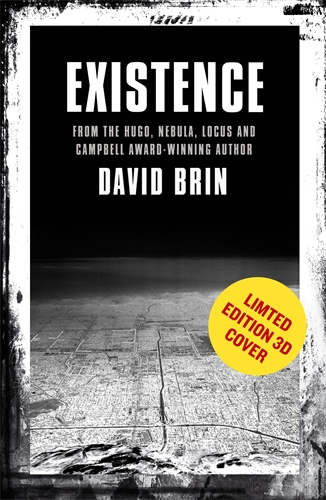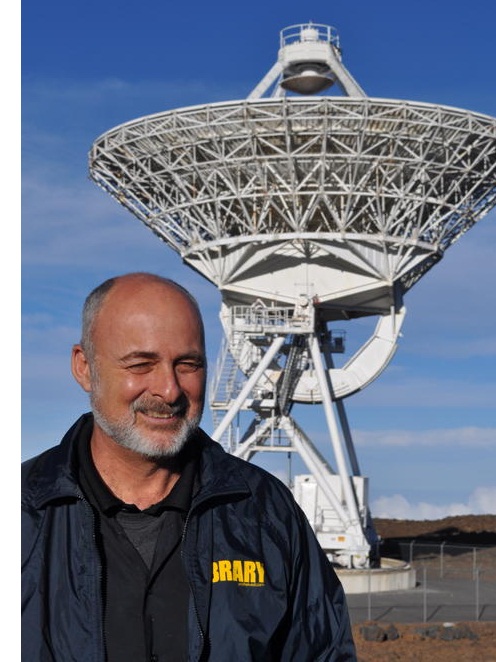 At the end of last year, we here at Orbit received?a very exciting treat in our inboxes . . . a?new manuscript?from?the?critically acclaimed?David Brin.
At the end of last year, we here at Orbit received?a very exciting treat in our inboxes . . . a?new manuscript?from?the?critically acclaimed?David Brin.
Author of the classic?UPLIFT?series, EARTH and?THE POSTMAN?(made into a major motion picture), he?s widely lauded not just for writing thrillingly addictive science fiction, but also for?his?track record?for accurately predicting?the future within his novels.
It?s been?ten years since the release of David?s last book, so the arrival of the?manuscript for?EXISTENCE (UK | ANZ)?really was quite an event. And it?s no exaggeration to say that this could well be his pi?ce de resistance.
It?s an edge-of-your-seat?novel of the?near-future, where?discovery of an alien artefact throws the world into chaos. The?absolute compelling nature of this book, and the sheer breadth and brilliance of the ideas expressed within?it?made me want to find out more about David?s thought processes?behind it?(beyond the usual?questions I?d ask as part of our author/editor relationship!). Read on for an insight into what lead to its creation . . .

David Brin - photo by Cheryl Brigham
AG: Despite your incredible success as a writer, you?ve mentioned elsewhere that being an author wasn?t your first career of choice. Tell us more?
DB: Writing was the first truly verifiable, repeatable and effective form of magic. Picture how it must have impressed ancient people to look at marks ? on papyrus or clay ? and know they conveyed the words of scribes and kings long dead. Knowledge, wisdom and art could finally accumulate, and death was robbed some of its sting. Writing still?is magical. To create strings of black squiggles that millions of others can skillfully de-code with just their eyes ? into emotions and thoughts, or the struggles of believable characters.
Still, every culture had storytellers. I was drawn toward a much newer kind of profession, that only gained real momentum the last few generations. Science. A shared endeavor to find out what is true, despite our preconceptions.? Wow, that too is amazing! And I managed to contribute a few new bits of knowledge.
Still, when a chance came along to combine the two? Who wouldn?t grab such an opportunity?
AG: It?s been almost a decade since the release of your last novel. Have scientific developments over the last 10 years forced you at all to reassess the vision of the future you?ve held in previous books?
DB: Well of course. But remember, good science fiction isn?t about any static view. It should offer thought experiments about change.? How it transforms real societies and realistic characters.? Change has been the one, great constant of modernity and its rate is accelerating.? Many of our social and political squabbles spiral around this one fact. A lot of folks don?t like the staccato pace of disruptions and new ideas, even good ones.?
But if we don?t poke ahead, peering into the fog, how will we ever find our way??
AG: At the centre of EXISTENCE is the discovery on an alien artifact ? leading to First Contact. You?re an active member of SETI and have written non-fiction on the ?Fermi Paradox? or Great Silence ? the question of why we seem to be alone in the cosmos. Was writing EXISTENCE perhaps a way to explore this paradox through fiction?
DB: It?s the Big Question. There are billions of stars older than our sun. Many sapient species may have preceded us by eons and at least a few should have left clear signs of their passage.? Why does the sky seem so empty of voices, then? Why was Earth apparently never visited? (And we would know, if it had been.)?
Does something ?filter? down the numbers? Just in the last brilliant decade, we?ve learned that planets are common and life seems likely to erupt almost anywhere with molten water. So what makes us rare? Intelligence?? Technology? Or the fact that we figured out how to advance a bit, without nuclear war? The range of possibilities is daunting. I tried to give most of them a nod . . .?amid a much broader plot about our near future.
AG: In EXISTENCE, you explore both pessimistic and optimistic visions. Did you feel that the time is particularly ripe for such a novel and do you see humanity at a tipping point?
DB: This generation will decide so many things about human destiny. Will we charge recklessly into lethal mistakes? Or the opposite danger: going nostalgic, cowering away from hard choices, and declining into stagnation? Or might we ? instead ? blend the intrepid brilliance of adolescence with mature caution, find the traps and quicksand pits and land mines, picking out a narrow path till our much-smarter grandchildren are ready to take over?
Sorry. That?s sobering stuff. But the second half of the question is this: can we explore all that in a rip-snortin? adventure yarn, stuffed with ideas, twists and irony??
AG: The near future of EXISTENCE portrays citizens sifting through a barrage of information, via virtual data overlain upon reality.? You hinted at some of this in EARTH. Now we see it all starting to come true, with the new Google Glass project! How do you see humans coping?
DB: Suppose you described today?s internet to the average person, in 1980, foretelling that they would zip virtually across the globe in 2012, accessing knowledge and games and amusements and news on multiple screens with divided attention . . . and loving it. Who would have believed you?? The same folks today ? 30 years older ? show more agility of attention than their younger selves could have imagined! That progression will follow us onto the streets and sidewalks. And yes, it will seem unnerving, at first. The technology will start awkward, cause accidents, nausea, confusion . . .
. . . and then the young will hack it. Improve it. Till it becomes a graceful layer of daily life, serving instead of confusing us. Empowering us. And just in time.
AG: EXISTENCE also explores technophobia in the extreme ? a desire to stop the progress of technology in order to protect the future of humanity. Do you see a War on Technology in our future?
DB: It?s already begun.? Grouchy or nostalgic voices of both right and left are busy denouncing the can-do spirit. Countless novelists, directors and faux ?news? channels use the latest hi-tech tricks to preach that ?nothing good will come from all this so-called progress!?? The movement is called Renunciation and at-core it raises some important points. Indeed, many species across the Galaxy may have tumbled into ruin from mis-use of science.?
In EXISTENCE, some smart and sincere characters give strong arguments for Renunciation. Still ? without undue spoilers ? I must say I?m skeptical that any solutions to our problems lie behind us, in the past. The way forward has always been . . .?forward.?
AG: Do you believe science fiction, as well as predicting the future, has a transformative power to affect or change the future?
DB: We claim not to predict but to experiment with possible tomorrows. Though there is satisfaction ? sometimes grim ? when your forecasts come true.
Of course, we hope that some of our readers will come away thinking new thoughts and perhaps just a bit more eager for better ways, better times ahead.?Or girded to prevent disastrous failure modes.? Indeed, the greatest science fiction tales might be called Self-Preventing Prophecies . . .?novels or films that affect millions, filling them with determination.? It?s what George Orwell achieved with Nineteen Eighty-Four, and Stanley Kubrick with Dr. Strangelove.? Soylent Green?recruited countless deeply-moved citizens to ponder what we have and how fragile it may be.
I may speak up for optimism ? the under-represented theme.? But warnings, also, are important.? It?s a minefield out there.? And a whole lot rides on our ability and willingness to cross it.
A limited edition of EXISTENCE (UK | ANZ)?with a?3D cover will be released on 21st June 2012 ? available only until stocks last. See a video?simulation of the cover?below.
?
Tags: David Brin, Existence, Google Glasses, science fiction, Technology, The Postman, Uplift
storage wars millionaire matchmaker millionaire matchmaker shawshank redemption 3 10 to yuma west virginia football west virginia football
No comments:
Post a Comment
Note: Only a member of this blog may post a comment.